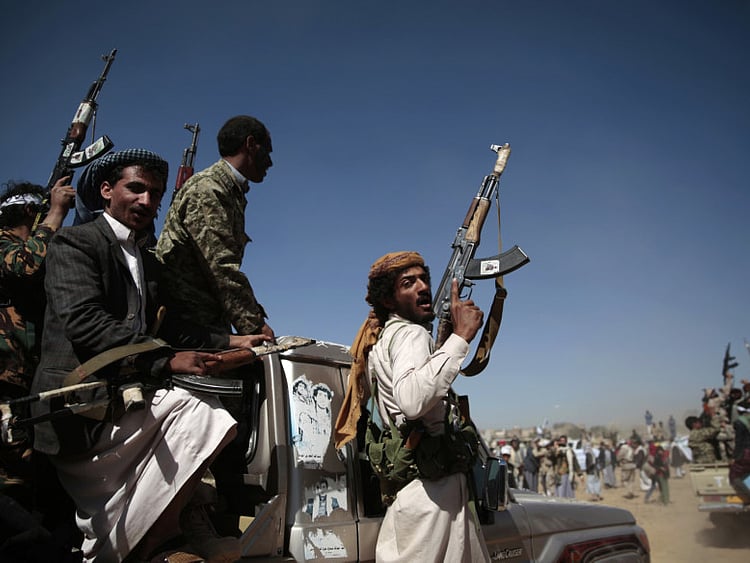Trump designates Houthis as terrorists, reversing Biden decision
‘As a result of weak policy, Houthis have fired at US Navy warships dozens of times’

Washington: US President Donald Trump signed an order on Wednesday that would once again categorize the Houthi militant group in Yemen as a terrorist organization “- nearly four years after the Biden administration revoked the designation.
Since then, the Houthis, who are aligned with Iran, have engaged in a lengthy campaign of missile and drone attacks on cargo ships and other vessels sailing in the Red Sea and Gulf of Aden. They’ve also fired upon Israel several times. The attacks started after the Hamas assault on Israel in October 2023, which triggered the war in Gaza.
The assaults have disrupted maritime commerce in the Middle East and continued despite repeated strikes on Houthi targets by the US, UK and Israel.
“As a result of the Biden administration’s weak policy, the Houthis have fired at US Navy warships dozens of times, launched numerous attacks on civilian infrastructure in partner nations, and attacked commercial vessels,” the White House said in a fact sheet on Wednesday evening.
Who is Abdul Malik Al Houthi?
Leader of the Houthi movement, based in Yemen.
Transformed the group from mountain fighters into a large, well-armed force.
Known for his battlefield skills and secretive nature (rare public appearances, avoids media).
Leads an army with tens of thousands of fighters, armed drones, and ballistic missiles.
Origins and rise to power
Began as a Zaydi, a Shiite sect, religious revival movement in Yemen’s far north during the 1990s.
Clashed with the Yemeni government and Saudi Arabia in guerrilla wars.
Seized the capital, Sana’a, in 2014, triggering Yemen’s civil war.
Now control much of northern Yemen and major population centers.
Houthi links with Iran
Part of Iran’s “Axis of Resistance” alongside Hezbollah and Hamas.
Accused of receiving weapons and training from Iran and Hezbollah (both deny these claims).
Motivated primarily by a domestic agenda, despite Iranian support.
The Houthis said this week that they would stop attacking US and UK vessels in the Red Sea in response to the Israel-Hamas ceasefire agreement. They also announced that they had released the crew of a commercial vessel that they hijacked more than a year ago.
Still, Western shipping firms are largely saying they’ll continue to avoid the area for now.
When the US designates a group as a terrorist organization, it categorizes the group as a significant threat to national or global security.
Here’s what it entails:
Legal and practical implications:
Asset freezing:
All financial assets of the organization or its leaders within the US jurisdiction are frozen.
US persons and entities are prohibited from providing funds, resources, or services to the group.
Criminal penalties:
Providing “material support” (e.g., money, training, equipment) to the group becomes a federal crime, punishable by significant fines or imprisonment.
Membership or active support of the organization can lead to criminal charges.
Visa and immigration restrictions:
Members or affiliates of the organization are barred from entering the US.
Non-citizens in the US who provide support may face deportation.
International ramifications:
The designation can influence global alliances and cooperation, as many countries align with US sanctions and adopt similar measures.
It can isolate the group economically and politically on a global scale.
Trump’s executive order “directs the secretary of State to recommend the re-designation of the Houthis within 30 days.” It also calls for the State Department and the US Agency for International Development to look into the work of organizations and contractors operating in Yemen and “end its relationship with entities that have made payments to the Houthis, or which have opposed international efforts to counter the Houthis.”
The terrorist designation was first applied at the end of Trump’s first term. President Joe Biden revoked it in 2021, citing the risk of famine in Yemen, a country that has been engulfed by civil war since 2014.
In January 2024, the Biden administration relisted the Houthis as a “specially designated global terrorist” group as opposed to the stricter “foreign terrorist organization” classification in order to leave some room for the group to engage in the United Nations-sponsored peace talks in Yemen.
That move was accompanied by the start of airstrikes against the group in retaliation for its decision to start maritime assaults.
Deprive resources
The Houthis, who were from Yemen’s north, rebelled against the UN-recognized government and seized the capital, Sana’a, in 2014. A Saudi Arabia-led coalition then intervened on the side of the government.
David Schenker, who was assistant secretary of state for Near Eastern affairs in the first Trump administration, said Trump’s move on Wednesday was an obvious, early step to respond to what he described as one of Iran’s leading proxy forces in the Middle East.
“While the redesignation likely won’t have a positive impact on the group’s behaviour, the measure suggests the new administration is not looking to induce (or cajole) the Iranians to negotiations through blandishment,” Schenker told Reuters.
The Trump administration said the US will work with regional partners to eliminate Houthi capabilities, deprive it of resources “and thereby end its attacks on US personnel and civilians, US partners, and maritime shipping in the Red Sea.”
The designation will also trigger a broad review of UN partners, non-governmental organizations and contractors operating in Yemen, the White House said.
“The President will direct USAID to end its relationship with entities that have made payments to the Houthis, or which have opposed international efforts to counter the Houthis while turning a blind eye towards the Houthis’ terrorism and abuses,” the White House said.
Sign up for the Daily Briefing
Get the latest news and updates straight to your inbox
Network Links
GN StoreDownload our app
© Al Nisr Publishing LLC 2026. All rights reserved.